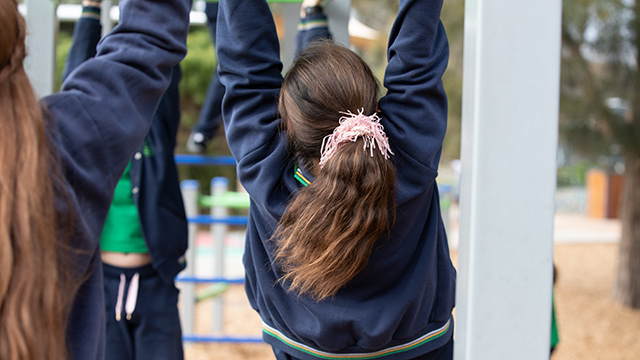On this page
Download this Fact Sheet:
Fact Sheet: Resilience and mental health (3.1 MB, PDF)
What is resilience?
Resilience refers to the ability to manage everyday stressors and challenges.
Resilience helps people cope with change and bounce back from challenges. This can help us shift back along the mental health continuum towards good mental health. A child or young person’s ability to be resilient can depend upon many things and can change depending upon their situation. Individuals can respond differently to stressors based on their unique experiences and needs.
Importantly, specific situations or events that one child or young person may find challenging, another may not. Learn more about how you can help build resilience in children and young people.
A child or young person who is resilient might:
- be optimistic
- use positive self-talk for encouragement
- have a positive sense of self
- identify and express their feelings and thoughts
- have helpful, age-appropriate strategies to manage their emotions when upset
- rearrange their plans to work around an unexpected situation
- have a sense of agency or responsibility
- keep on trying if something doesn’t work out and use their judgment about when to stop
- hold a sense of purpose or hope for the future
- actively seek help if they need it
- feel a sense of attachment to family, their learning community and to learning.
Why is resilience important?
Resilience has been associated with better academic performance and behaviour and, longer-term, is associated with greater life opportunities (including employment and satisfying relationships).
Resilience helps children and young people manage life’s ups and downs
Children and young people with greater levels of resilience are better able to manage stress. When children and young people learn to navigate these stressors, it can support their mental health and wellbeing now and into the future.
Ups and downs can range from everyday challenges like conflict with friends or falling off a bike. They can be emotional experiences such as loss, rejection, disappointment or humiliation. Some children and young people face serious challenges like family separation, family illness, death, or bullying.
Feeling optimistic and hopeful can support mental health and wellbeing
Children and young people’s resilience can be enhanced when they:
- are loved by someone unconditionally
- have an older person outside the home they can talk to about challenges and feelings
- are praised for doing things on their own and striving to achieve
- feel that their culture is respected
- experience a sense of belonging
- can count on their family and community being there when needed
- know someone they want to be like
- believe things will turn out all right
- are willing to try new things
- feel that what they do makes a difference in how things turn out
- like themselves
- can focus on a task and stay with it
- have a sense of humour
- make goals and plans, both short and longer-term.
Be You Professional Learning
Learn more about how to incorporate practices that can enhance children and young people's resilience into your teaching practice in the Learning Resilience domain.
-
References
Australian Government Department of Education (AGDE). (2022). Belonging, Being and Becoming: The Early Years Learning Framework for Australia (V2.0). Australian Government Department of Education for the Ministerial Council. Retrieved from: https://www.acecqa.gov.au/sites/default/files/2023-01/EYLF-2022-V2.0.pdf.
Cahill, H., Beadle, S., Forster, R., Smith, K., & Farrelly, A. (2014). Building resilience in children and young people. Melbourne: Melbourne University Graduate School of Education. Retrieved from http://www.education.vic.gov.au/Documents/about/department/resiliencelitreview.pdf.
Council of Australian Governments (COAG). (2009). Investing in the early years: A national early childhood development strategy. Canberra: Commonwealth of Australia. Retrieved from https://www.startingblocks.gov.au/media/1104/national_ecd_strategy.pdf.
Ginsburg, K. R. (2007). The importance of play in promoting healthy child development and maintaining strong parent-child bonds. Pediatrics, 119(1), 182-191.
-
External links
Australian Institute of Family Studies – Is resilience still a useful concept when working with children and young people?
Collaborative for Academic, Social and Emotional Learning (CASEL)
